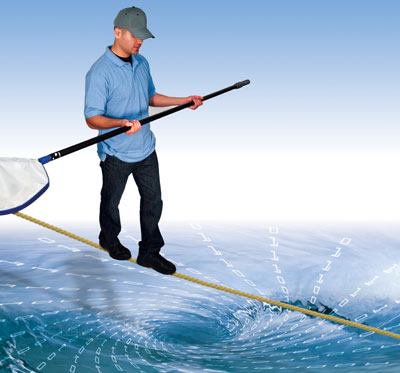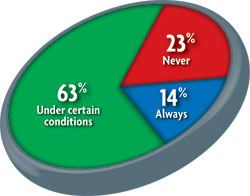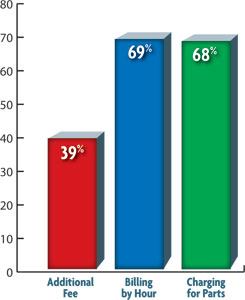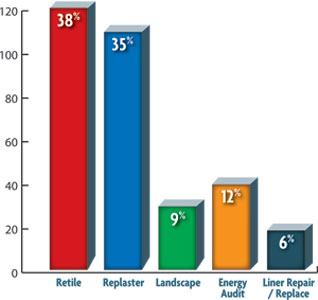The rise of online retail leaves Todd Joyce with mixed feelings.
“Go online right now, and you can find some of the same products I sell, for less than I pay at the distributor,” says the owner of Expert Pool & Spa Inc. in Omaha, Neb. “But I’m guilty of looking for the lowest price online too, just as much as anyone.”
Joyce shares this conflicted mindset about the Internet with service technicians around the country. No one wants to give up the right to compare prices online, but it’s that very practice that’s driving thousands of local stores — in the pool service industry and others — out of business.
This frustration is understandable, but a recent Pool & Spa News survey revealed that a far deeper issue is at stake. On one hand, Internet price competition seems unavoidable. This, in turn, leaves a growing number of service technicians wondering if it’s time to extend an olive branch to their online competitors.
“The Internet is killing us,” as one survey respondent wrote. “Maybe it is time we start working with them.”
But many others feel that online businesses are damaging more than just profits. The core role of a service tech is selling and maintaining trusted equipment chosen by an industry professional, they say. So supporting online purchases strikes at the very identity of a traditional pool service company.
“If I have to give up my business to service products someone bought on the Internet,” said one respondent, “it’s time for me to retire.”
Here, we examine the roots of this conflict, and explore new trends revealed by the survey’s results.
Branching out
As the owners of service companies watch their profits diminish from online competition, they are left with the choice of either finding a more effective way to compete, or gaining new avenues for turning a profit.
As one survey respondent put it, “Internet sales are here to stay. It’s time to create policies to protect your profit margins so you can service these products.”
Indeed, more than 75 percent of service techs surveyed said they’d be willing to work on a product a customer bought online, at least under certain conditions. But the vast majority of respondents also said that Internet-bought products account for 5 percent or less of their service calls.
As online competition continues to ramp up though, an increasing number of service techs are coming to the same conclusion: “If you can’t beat ’em, join ’em.”
Some, like Bryan Chrissan, president of Clear Valley Pool Service in Temecula, Calif., have started partnering with online retailers. In this type of arrangement, an e-tailer may send out an alert to all partner techs in a certain geographic region when their Website sells a piece of installation-eligible equipment to a consumer in that area.
After forming alliances with a number of these companies, Chrissan says, he’s been swamped with referrals — and he doesn’t mind losing some retail profits if he can expand his customer base. “I use every service call as an opportunity to make a good impression,” he says. “Because next time that customer has an equipment issue, guess who he’s going to call?”
Along with this technique, Chrissan has found that it’s easy to protect his bottom line as long as he charges a time-based rate for service. “When a customer asks me how much I charge for a visit, I say, ‘Depends how long it takes,’” he says. Quite a few survey respondents shared this view — approximately 70 percent said they charge by the hour to service Internet-bought equipment, and a similar percentage said they charge for all replacement parts when servicing a product purchased online.
Other companies, such as SpaScapes in Rocklin, Calif., are getting more aggressive with their online presence in order to secure long-term service accounts. The retail and service company has launched a Website, which it actively promotes on search engines.
“If somebody’s searching for a hot tub online, we’re there,” says general manager Todd Smith. “That gives us the opportunity to show off our brick-and-mortar presence as well, which creates a foundation for building a service relationship with that customer.”
The future holds plenty of promise for professionals who are willing to “stretch their legs” a little, according to a number of service techs.
“The only thing left to do is figure out a way to work the new system, and mold your business to it,” Chrissan adds. “Yes, a lot of mom-and-pop companies are closing down, but plenty of other guys are out there making serious money right now.”
To understand why this works, it helps to remember what it is, exactly, that a successful service company stands to profit from today: Not products, but friendliness and expertise. Whether it’s building up an online presence, structuring prices differently, or trying to network with Internet retailers, it’s the personal touch that sets the winners apart from the herd.
“We do a very thorough orientation with every client,” says Norm Coburn, president of New England Spas in Natick, Mass. “We plug the fact that they can bring us a water sample any day of the week, and for free, we’ll test the water and make recommendations as to how to treat it. That’s something no Internet retailer offers.”
Coburn adds that it’s more than just expertise that keeps his customers loyal — it’s the genuine relationships that only a local brick-and-mortar store can offer. “It never ceases to amaze me that customers greet our staff by first name, and my staff return the first-name greeting,” he says. “And that right there is how you beat the Internet.”




